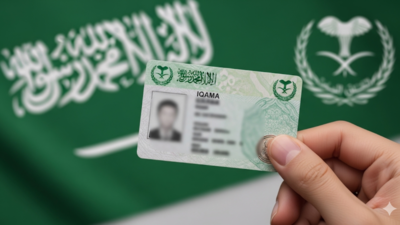ARTICLE AD BOX

The Saudi Iqama is a mandatory residency permit enabling legal work, healthcare, banking, and family sponsorship/Representative Image
In Saudi Arabia, the Iqama is more than just a residency permit — it is the central document that governs the life and work of every foreign national living in the Kingdom. From legal status to access to essential services, the Iqama plays a pivotal role in the everyday life of expatriates.
This guide breaks down everything about the Iqama, from its purpose and benefits to the detailed process of obtaining and renewing it, including a breakdown of the associated costs.
What is Iqama and why is it important?
The Iqama is an official residency permit issued by Saudi Arabia’s Ministry of Interior to foreign nationals who live and work in the country. While a person can initially enter the Kingdom on a work visa, they are unable to legally access most services until the Iqama is issued.Once granted, the Iqama acts as proof of legal residency and work authorization. It is essential for accessing basic services and conducting day-to-day transactions in the Kingdom.Key Functions of the Iqama:
- Legal Residency: Establishes the holder’s lawful status in Saudi Arabia.
- Work Authorization: Certifies eligibility to work in the country.
- Service Access: Enables access to banking, healthcare, education, property rental, and more.
- Family Sponsorship: Allows the resident to sponsor their spouse and children for residency.
- Travel Flexibility: May allow visa-free or on-arrival entry to certain Gulf Cooperation Council (GCC) countries.
Validity and renewal rules
Though the physical Iqama card is issued for five years, its legal validity depends on annual renewal, closely tied to the employment contract and the sponsoring company. If the sponsoring company ceases operations, the Iqama becomes invalid.
In such a case, the expatriate must either find a new sponsor or leave the country.Renewal Essentials:
- Renewal Period: Typically done annually; must be completed on time to avoid penalties.
- Responsibility: The sponsoring employer handles the renewal, not the employee.
- Legal Risks: Delayed renewal may result in fines or legal complications.
Step by step process for Iqama issuance (employer’s role)
The Iqama issuance process is structured and primarily handled by the employer or business owner acting as the sponsor. Here’s how the process works:1. Company registration
- The employer must register the business with the Ministry of Labor and Social Development (MLSD).
- It is common to appoint a local legal representative to manage this step
2. Visa approval via MISA
- Business owners or company founders must apply for a visa through the Ministry of Investment (MISA).
- Approval Timeline: Usually completed within two weeks.
- For employees, this step may vary based on job role and internal company policies.
3. Visa issuance from Saudi embassy
- After MISA approval, a visa authorization number is issued.
- The employee must then submit:
- Educational qualifications
- Medical certificate
- Biometrics
- Timeframe: Generally issued within a week.
4. Arrival and medical examination
- Upon entering Saudi Arabia, the individual must undergo a mandatory medical exam at an approved health center.
- Simultaneously, the individual must:
- Obtain medical insurance
- Activate a Saudi SIM card
5. Iqama issuance
- Once all required documents and health checks are complete, the Iqama is processed.
- Issuance Time: Can be done the same day.
- The card can be collected in person or by a Saudi national on the employee’s behalf.
6. Registration on e-government platforms
- The final step is registering on platforms like Absher and Nafath.
- These systems are vital for:
- Online banking setup
- Property rental
- Vehicle registration
- Utility services
Costs and fees breakdown
Holding an Iqama comes with recurring fees, which are usually covered by the employer. These include issuance charges, work permit fees, and dependent levies for family members.Iqama issuance & renewal fees
| Duration | Iqama Fee (SAR) |
| 3 months | 163 |
| 6 months | 325 |
| 9 months | 488 |
| 1 year | 650 |
Additional yearly costs
| Category | Fee (SAR) |
| Medical Insurance | 600 |
| GOSI (Social Insurance) | 800 |
| ATM Card | 200 |
Expat work permit & dependent fees
- Work Permit (Maktab Amal): SAR 800/month (per foreign worker)
- Dependent Fee: SAR 400/month (per family member)
These figures apply annually and may vary if the residency period is shorter. Employers typically bear the full financial responsibility, including repatriation costs if the employment contract ends



.png)
.png)
.png)
















 1 hour ago
4
1 hour ago
4








 English (US) ·
English (US) ·